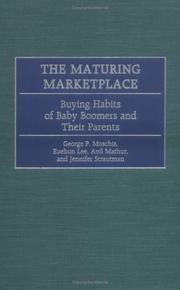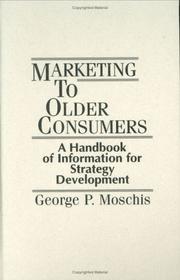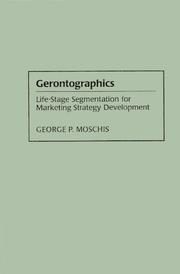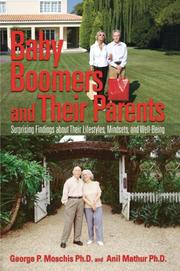| Listing 1 - 10 of 13 | << page >> |
Sort by
|

ISBN: 1567203442 9786610868858 1280868856 0313000522 0585393125 9780585393124 9780313000522 9781280868856 9781567203448 9798400683725 Year: 2000 Publisher: Westport, Conn. : London : Praeger, Bloomsbury Publishing,
Abstract | Keywords | Export | Availability | Bookmark
 Loading...
Loading...Choose an application
- Reference Manager
- EndNote
- RefWorks (Direct export to RefWorks)
This work examines the ways in which the buying habits of baby boomers differ from the habits of their parents, detailing the ways in marketers can use the various insights in the book to market a broad range of goods and services.
Consumer behavior-- United States. --- Commerce --- Business & Economics --- Marketing & Sales --- Consumer behavior --- Baby boom generation --- Middle-aged consumers --- Older consumers --- Market segmentation --- Attitudes. --- Baby boomers --- Boomers, Baby --- Generation, Baby boom --- Post-war generation --- Postwar generation --- Aged as consumers --- Aged consumers --- Generations --- Population --- Consumers
Book
ISBN: 0884061248 Year: 1978 Publisher: Atlanta, Ga College of Business Administration
Abstract | Keywords | Export | Availability | Bookmark
 Loading...
Loading...Choose an application
- Reference Manager
- EndNote
- RefWorks (Direct export to RefWorks)
Consumer education --- Socialization --- Teenage consumers --- 658.8 --- 659 --- 658.8 Marketing. Sales. Selling. Distribution --- Marketing. Sales. Selling. Distribution --- Child socialization --- Children --- Enculturation --- Social education --- Education --- Sociology --- 659 Publicity. Information work. Public relations --- Publicity. Information work. Public relations --- Teenagers as consumers --- Consumers --- National consumption --- Didactics of social education
Book
ISBN: 0669112445 Year: 1987 Publisher: Lexington, Mass. Lexington Books
Abstract | Keywords | Export | Availability | Bookmark
 Loading...
Loading...Choose an application
- Reference Manager
- EndNote
- RefWorks (Direct export to RefWorks)
Consumers --- Marketing research --- #SBIB:309H2812 --- 658.8 --- 659 --- 658.8 Marketing. Sales. Selling. Distribution --- Marketing. Sales. Selling. Distribution --- Market research --- Marketing --- Markets --- Research --- Research, Industrial --- Customers (Consumers) --- Shoppers --- Persons --- 659 Publicity. Information work. Public relations --- Publicity. Information work. Public relations --- Marketing, consumentengedrag, consumentisme --- Consumer behavior
Book
ISBN: 9783031130977 9783031130960 Year: 2022 Publisher: Cham Springer
Abstract | Keywords | Export | Availability | Bookmark
 Loading...
Loading...Choose an application
- Reference Manager
- EndNote
- RefWorks (Direct export to RefWorks)
Older consumers. --- Marketing. --- Consumer goods --- Domestic marketing --- Retail marketing --- Retail trade --- Industrial management --- Aftermarkets --- Selling --- Aged as consumers --- Aged consumers --- Consumers --- Marketing
Digital
ISBN: 9783030050085 Year: 2019 Publisher: Cham Springer International Publishing
Abstract | Keywords | Export | Availability | Bookmark
 Loading...
Loading...Choose an application
- Reference Manager
- EndNote
- RefWorks (Direct export to RefWorks)
This book examines consumer behavior using the “life course” paradigm, a multidisciplinary framework for studying people's lives, structural contexts, and social change. It contributes to marketing research by providing new insights into the study of consumer behavior and illustrating how to apply the life course paradigm’s concepts and theoretical perspectives to study consumer topics in an innovative way. Although a growing number of marketing researchers, either implicitly or explicitly, subscribe to life course perspectives for studying a variety of consumer behaviors, their efforts have been limited due to a lack of theories and methods that would help them study consumers over the lifecycle. When studying consumers over their lifespan, researchers examine differences in the consumer behaviors of various age groups (e.g., children, baby boomers, elderly, etc.) or family life stages (e.g., bachelors, full nesters, empty nesters, etc.), inferring that consumer behavior changes over time or linking consumption behaviors to previous experiences and future expectations. Such efforts, however, have yet to benefit from an interdisciplinary research approach. This book fills this gap in consumer research by informing readers about the differences between some of the most commonly used models for studying consumers over their lifespan and the life course paradigm, and providing implications for research, public policy, and marketing practice. Presenting applications of the life course approach in such research topics as decision making, maladaptive behaviors (e.g., compulsive buying, binge eating), consumer well-being, and cognitive decline, this book is beneficial for students, scholars, professors, practitioners, and policy makers in consumer behavior, consumer research, consumer psychology, and marketing research.
Economic sociology --- Demography --- Consumer behavior --- Market research --- demografie --- sociale economie --- consumentengedrag --- consumptie --- marktonderzoek

ISBN: 0899307647 Year: 1992 Publisher: New York (N.Y.): Quorum
Abstract | Keywords | Export | Availability | Bookmark
 Loading...
Loading...Choose an application
- Reference Manager
- EndNote
- RefWorks (Direct export to RefWorks)
Book
ISBN: 9783031565489 Year: 2024 Publisher: Cham : Springer Nature Switzerland : Imprint: Springer,
Abstract | Keywords | Export | Availability | Bookmark
 Loading...
Loading...Choose an application
- Reference Manager
- EndNote
- RefWorks (Direct export to RefWorks)
This book provides doctoral students, junior faculty and early-career researchers with guidelines, resources and strategies for performing and publishing academic research successfully. It helps increase the productivity of researchers by showing efficient and effective ways to increase research output and publication probability, ranging from manuscript preparation and positioning to working with co-authors and journal reviewers. The author uses research findings, anecdotal evidence and illustrations from his academic career to support his views on strategies and tactics that are required of scholars in order to succeed.
Executives --- Research --- Penmanship. --- Management Education. --- Research Skills. --- Writing Skills. --- Training of. --- Methodology.

ISBN: 1567200621 Year: 1996 Publisher: Westport (Conn.) Greenwood press
Abstract | Keywords | Export | Availability | Bookmark
 Loading...
Loading...Choose an application
- Reference Manager
- EndNote
- RefWorks (Direct export to RefWorks)
Market segmentation --- Marketing --- Older consumers --- Management

ISBN: 9780978660246 Year: 2007 Publisher: Ithaca Paramount Market Publishing
Abstract | Keywords | Export | Availability | Bookmark
 Loading...
Loading...Choose an application
- Reference Manager
- EndNote
- RefWorks (Direct export to RefWorks)
Book
ISBN: 9783030050085 3030050084 3030050076 Year: 2019 Publisher: Cham Springer International Publishing :Imprint: Springer
Abstract | Keywords | Export | Availability | Bookmark
 Loading...
Loading...Choose an application
- Reference Manager
- EndNote
- RefWorks (Direct export to RefWorks)
This book examines consumer behavior using the “life course” paradigm, a multidisciplinary framework for studying people's lives, structural contexts, and social change. It contributes to marketing research by providing new insights into the study of consumer behavior and illustrating how to apply the life course paradigm’s concepts and theoretical perspectives to study consumer topics in an innovative way. Although a growing number of marketing researchers, either implicitly or explicitly, subscribe to life course perspectives for studying a variety of consumer behaviors, their efforts have been limited due to a lack of theories and methods that would help them study consumers over the lifecycle. When studying consumers over their lifespan, researchers examine differences in the consumer behaviors of various age groups (e.g., children, baby boomers, elderly, etc.) or family life stages (e.g., bachelors, full nesters, empty nesters, etc.), inferring that consumer behavior changes over time or linking consumption behaviors to previous experiences and future expectations. Such efforts, however, have yet to benefit from an interdisciplinary research approach. This book fills this gap in consumer research by informing readers about the differences between some of the most commonly used models for studying consumers over their lifespan and the life course paradigm, and providing implications for research, public policy, and marketing practice. Presenting applications of the life course approach in such research topics as decision making, maladaptive behaviors (e.g., compulsive buying, binge eating), consumer well-being, and cognitive decline, this book is beneficial for students, scholars, professors, practitioners, and policy makers in consumer behavior, consumer research, consumer psychology, and marketing research.
Economic sociology --- Demography --- Consumer behavior --- Market research --- demografie --- sociale economie --- consumentengedrag --- consumptie --- marktonderzoek --- Motivation research (Marketing). --- Population. --- Market research. --- Consumer Behavior. --- Population Economics. --- Market Research/Competitive Intelligence. --- Marketing --- Markets --- Research --- Research, Industrial --- Human population --- Human populations --- Population growth --- Populations, Human --- Economics --- Human ecology --- Sociology --- Malthusianism --- Advertising --- Marketing research --- Motivation (Psychology) --- Psychological aspects --- Motivation research (Marketing) --- Marketing research.
| Listing 1 - 10 of 13 | << page >> |
Sort by
|

 Search
Search Feedback
Feedback About UniCat
About UniCat  Help
Help News
News